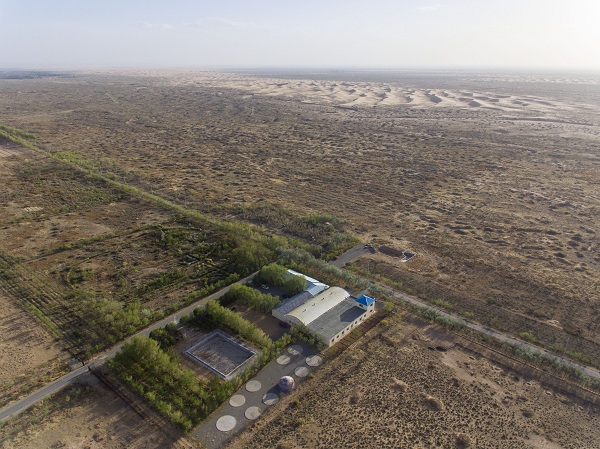Healing "Mother Mountains" in Inner Mongolia


A swathe of vegetation has formed a barrier against the distant undulating sand dunes in Alxa League, north China's Inner Mongolia Autonomous Region, May 3, 2019. [Photo by Liu Lei/Xinhua]
The Helan Mountains in Alxa League, North China's Inner Mongolia autonomous region, is starting to heal from decades of overexploitation, under an ecological restoration campaign launched by the local government three years ago.
According to Zhang Baojun, deputy director of the management bureau of Helan Mountains national nature reserve, facilities of 15 mining enterprises have been demolished, 17 coal mines permanently closed, over 3 million cubic meters of mining pits refilled, and the vegetation in a 667-hectare mining area restored.
The mighty Helan Mountains, stretching between Ningxia Hui autonomous region and Inner Mongolia, is an important ecological barrier in northwest China.
Known as the "Mother Mountains" by the people of Alxa League, the mountains block the eastward invasion of the Tengger Desert and cold current from the Siberian region, protecting eco-environment of the plains to its east.
Endowed with abundant coal resources, the part of Helan Mountains in the Alxa League suffered a lot from excessive and disorderly development since the 1950s, with air polluted and grassland degraded, until officials moved to tackle environmental problems.
"The mining enterprises which had been shut down once contributed to one-sixth of local financial revenues, but we must protect our 'mother mountains' and guard green ecological barrier for the benefit of next generations," said a local official.
A similar ecological restoration campaign was also launched in October 2015 across the nature reserve in Qilian Mountains on the border of northwest China's Gansu and Qinghai provinces, with construction projects under close scrutiny and mines being decommissioned. Enditem
MOST POPULAR
- 1 China to give visa-free treatment to another 9 countries
- 2 China fully opens manufacturing sector to foreign investors in landmark opening up move
- 3 China's import expo attracts record-breaking participating countries, exhibitors
- 4 China's door opening even wider to foreign visitors, businesses
- 5 China revises rules to ease foreign strategic investment in listed firms
Editors' Picks
 Video:
Peru sees new port open
Video:
Peru sees new port open
 Infographic:
China's public holidays for 2025
Infographic:
China's public holidays for 2025
 Infographic:
Basic facts of APEC
Infographic:
Basic facts of APEC
 Infographic:
Wrapping up the 7th CIIE: Data recap
Infographic:
Wrapping up the 7th CIIE: Data recap



